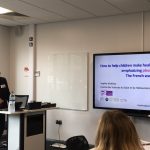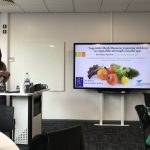By Dr Robert Dempsey, Senior Lecturer in Psychology.
As part of an exciting and innovative  collaboration between eight UK universities and the Student Minds charity, we are conducting a national survey of the relationship between students’ experiences of high and variable moods with their academic experiences and general wellbeing. Experiences of variable mental health by university students has received significant attention over the past few years, with increases in the rates of reported mental health issues amongst students aged between 18 and 24 years and an increased number of students disclosing mental health difficulties to their universities (IPPR, 2017).
collaboration between eight UK universities and the Student Minds charity, we are conducting a national survey of the relationship between students’ experiences of high and variable moods with their academic experiences and general wellbeing. Experiences of variable mental health by university students has received significant attention over the past few years, with increases in the rates of reported mental health issues amongst students aged between 18 and 24 years and an increased number of students disclosing mental health difficulties to their universities (IPPR, 2017).
Whilst there has been a lot of discussion of students’ experiences of depression, anxiety, suicidality and the engagement in self-harm related behaviours, there has been little focus on the experience of high and variable moods amongst students and how this might impact on their social and academic functioning. High moods, which are associated with increased energy and activity levels, disturbed sleeping patterns, but also the engagement in more impulsive and risky behaviours, could have as much of an impact on student wellbeing during university studies as can depression, anxiety and negative moods. Given that studying for a degree is often one of the most stressful experience encountered in students’ lives, understanding how students respond to this stress and manage their moods is important for developing preventative interventions and improving students’ overall wellbeing and university experience.
 Our unique collaboration aims to better understand students’ experiences of high and variable moods, identify the predictors of high mood amongst students and the potential avenues for intervention to improve students’ wellbeing and performance at university. As part of a collaborative network of researchers based at eight UK universities, which Staffordshire University is pleased to be part of (alongside Northumbria, King’s College London, Exeter, Manchester, Newcastle, Reading, and Glasgow universities) and Student Minds, we have launched a national survey of students’ experiences of high mood. We plan to follow-up this first survey with additional surveys to allow us to understand how students’ experiences of changeable and high moods develop over time.
Our unique collaboration aims to better understand students’ experiences of high and variable moods, identify the predictors of high mood amongst students and the potential avenues for intervention to improve students’ wellbeing and performance at university. As part of a collaborative network of researchers based at eight UK universities, which Staffordshire University is pleased to be part of (alongside Northumbria, King’s College London, Exeter, Manchester, Newcastle, Reading, and Glasgow universities) and Student Minds, we have launched a national survey of students’ experiences of high mood. We plan to follow-up this first survey with additional surveys to allow us to understand how students’ experiences of changeable and high moods develop over time.
Updates about this study and other research being conducted in the Staffordshire Centre for Psychological Research will be posted on the Department of Psychology’s InPsych blog!
The National Survey: Seeking University Students!
The survey is open to all UK university students  aged between 18 and 25 years who are currently enrolled at any UK university. We are seeking a broad range of participants, including those who perhaps haven’t experienced any high or variable moods, to take part in the survey and help to inform future interventions in this area.
aged between 18 and 25 years who are currently enrolled at any UK university. We are seeking a broad range of participants, including those who perhaps haven’t experienced any high or variable moods, to take part in the survey and help to inform future interventions in this area.
Note that Staffordshire, Northumbria and Exeter Psychology students can take part via their SONA systems (the study is listed in SONA and can be completed in return for credits). All UK students who complete the survey can also opt-in to a prize draw for vouchers.
For further information and/or to take part, please click here to visit the survey’s website.
Currently a student, but aged 25 years and over?
A separate study I am conducting is investigating how pro-social behaviours such as volunteering impact on mental health and coping strategies, e.g. suicidal thinking and self-harm. This is another collaborative study between myself, based at Staffordshire, and researchers at external universities.
Anyone can participate in this separate study (there is no age limit) which takes the form of an online survey of personality, prosocial behaviours and mental health. Students studying at Chester, Nottingham Trent and Staffordshire universities can sign up to the study in SONA to receive credits (please log into SONA to find the study).
If you are not a Chester/Staffs/Trent student, you can find out more about the prosocial behaviour study by clicking here. Chester/Staffs/Trent students please see SONA for more details.
The Staffordshire Centre for Psychological Research is home to research activity in the Psychology Department at Staffordshire University. The Centre is home to a number of research-active psychologists who are engaged in research across a wide range of psychological subdisciplines. The Centre has two overarching research streams: Health and Behaviour Change and Applied Development, Social and Cognitive Psychology.
[youtube https://www.youtube.com/watch?v=QROJn3W9bAw?version=3&rel=1&fs=1&autohide=2&showsearch=0&showinfo=1&iv_load_policy=1&wmode=transparent]
The Centre provides training for PhD students, Research Masters degrees, as well as Professional Doctorates in Clinical and Health Psychology (click here for more details). The Centre also provides bespoke training to private and public organisations, as well as expertise for consultancy research opportunities. For more details about the Centre, its research activities, events and consultancy, please visit our website (click here).
 Health Psychology, Staffordshire Centre for Psychological Research) was featured in The Sentinel newspaper commenting on recent statistics from the National Child Measurement Programme showing concerning rates of childhood obesity in the Staffordshire county. The Sentinel story highlights high rates of children who are classed as obese or overweight in parts of Stoke-on-Trent and the wider county.
Health Psychology, Staffordshire Centre for Psychological Research) was featured in The Sentinel newspaper commenting on recent statistics from the National Child Measurement Programme showing concerning rates of childhood obesity in the Staffordshire county. The Sentinel story highlights high rates of children who are classed as obese or overweight in parts of Stoke-on-Trent and the wider county. centre of excellence for teaching and research in Health Psychology, and is home to Staffordshire’s BPS Accredited Stage 1 MSc in Health Psychology and Stage 2 Professional Doctorate in Health Psychology. The Centre for Health Psychology is part of the Staffordshire Centre for Psychological Research.
centre of excellence for teaching and research in Health Psychology, and is home to Staffordshire’s BPS Accredited Stage 1 MSc in Health Psychology and Stage 2 Professional Doctorate in Health Psychology. The Centre for Health Psychology is part of the Staffordshire Centre for Psychological Research.























